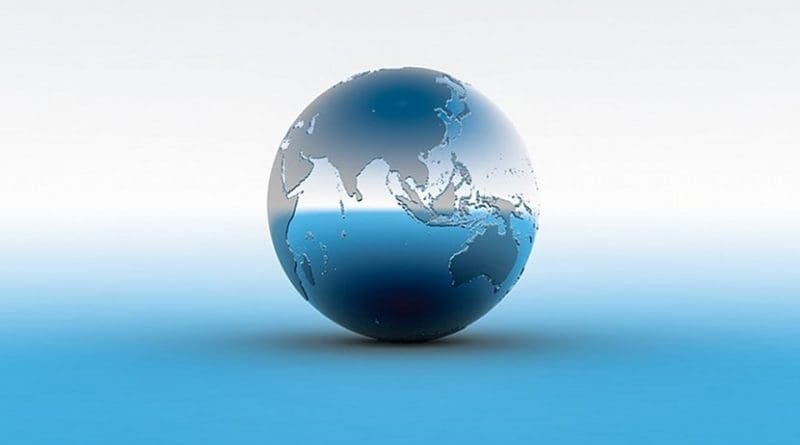ASEAN Leaders Must Condemn Illegal Acts In South China Sea – OpEd
For the last four decades, the whole of Southeast Asia has been enjoying an unprecedented peace. Now that peace is under serious threat because of one country’s illegal and provocative actions and maritime ambitions.
That country is none other than China, which is not even a Southeast Asian country. China claims more than 90 percent of the South China Sea (SCS) based on a controversial nine-dash line and historical grounds. The SCS is one of the busiest waterways through which around US$5 trillion worth of goods pass through annually.
As a new hegemon in the region, China apparently has little respect for international maritime rules and the sovereignty of other neighboring nations.
In July, China’s survey ship Haiyang Dizhi 8 (HD8) illegally encroached on Vietnam’s legal exclusive economic zone (EEZ) and threatened Vietnam’s oil and gas explorations in the Vanguard area. The HD8 was escorted by armed coast guard vessels. Finally, on Oct. 24, the Chinese ship and its escorts left the Vietnamese waters.
Most ASEAN countries kept quiet about this issue. But Vietnam strongly condemned China’s acts and called for the immediate withdrawal of HD8 and Chinese coastguard vessels from its territorial waters.
“We will resolutely and persistently maintain independence while fighting for the protection of our sovereignty, but we must maintain a peaceful environment for development,” said Vietnamese President Nguyen Phu Trong recently in Hanoi.
“What belongs to our independence and national sovereignty, we will never give up. We are determined to fight and win.”
The Philippines and Malaysia have also faced intimidation from China in the disputed waters of the SCS.
All these acts are clear violations of the 1982 United Nations Convention on the Law of the Sea (UNCLOS), under which every maritime state is entitled to have a 200-nautical mile EEZ and a 12-nautical mile continental shelf.
With the exception of Taiwan, all the SCS claimants – China, Vietnam, Malaysia, the Philippines and Brunei Darussalam – have signed the historic UNCLOS maritime treaty and ratified it a long time ago. Indonesia, a non-claimant state, has also signed and ratified the treaty. The UNCLOS treaty prohibits the use of force or threat of using force in resolving maritime disputes.
In a historical ruling in 2016, the Hague-based Permanent Court of Arbitration (PCA), while responding to the Philippines request over Scarborough Shoal, bluntly rejected all claims of China in the SCS as they were not in line with the UNCLOS, in which China is a signatory. China refused to accept the PCA ruling.
It was not the first time China violated the UNCLOS. It illegally built artificial islands and deployed deadly weapons on those islands. It was the only country that used force in the SCS disputes when it forcibly occupied the Paracel Islands, which are claimed by Vietnam and Taiwan.
In 2017 and 2018, China forced Vietnam and Spanish oil firm Repsol to cease oil exploration activities near Vanguard area.
A Chinese ship recently rammed and sank an anchored Filipino fishing boat in the Recto Bank, 160 kilometers off the Philippine island of Palawan.
Hundreds of Chinese armed maritime vessels regularly and illegally operate in waters surrounding Pagasa Island (Thitu Island), which threatens the activities of local Filipino fishermen.
Manila has also issued a protest over the illegal passage of four Chinese warships and the aircraft carrier Liaoning through Philippine waters.
In May 2019, Chinese coastguard vessels were patrolling around the Luconia Shoals, which lie within the EEZ of Malaysia.
In the absence of strong opposition and the declining influence of the US, China is now bolder in pursuing its maritime ambitions. Now its eyes are on the Spratly Islands.
It seems there is no respect for the law in the region. So what should we do?
All ASEAN leaders as well as leaders of the US, Japan, South Korea, India, Russia, Australia, New Zealand and China will be attending the 35th ASEAN Summit and the 14th East Asia Summit (EAS) in Bangkok from Nov. 2-4.
ASEAN leaders must unite and condemn China’s activities in the SCS, which threaten the peace and stability of the region. ASEAN is a family and its five members, including Indonesia, are affected by China’s activities. They should seek a rules-based regional order in the SCS.
At any cost, ASEAN’s centrality and unity must be maintained.
The global and regional powers, who are members of the EAS, must also condemn China and call for a rules-based regional order.
Both ASEAN and EAS leaders must call all the SCS claimants to respect the UNCLOS as it is the best maritime law in the world.
War is not the solution to solve all the disputes of the SCS. All disputes must be resolved through peaceful negotiations.
It is not a conflict between China and ASEAN. We should not forget that China is an important partner to ASEAN in many aspects. China, in the past, has agreed to the Declaration on the Conduct of Parties in the South China Sea (DOC) to reduce tensions and avoid conflict. Though it is weak in many aspects, the DOC must be fully implemented to reduce tensions.
ASEAN and China must speed up the Code of Conduct (CoC) for all parties to reduce tensions. ASEAN leaders should not compromise on the CoC. All we need is a legally binding, effective CoC based on the 1982 UNCLOS and other international rules. There should also be freedom of navigation and overflight in SCS waters.
Peace must be prevailed in the SCS at any cost.

